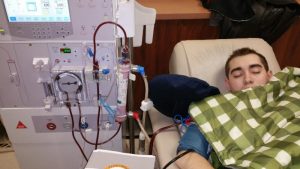Bringing It Home
by C. Zak
My son, who is affected by this disease, has sailed through life without much difficulty. He played competitive sports, always had enthusiastic energy, and by most measures, excelled in life. No outsider would suspect he was affected by a medical condition. Unfortunately, his condition status changed in the Fall of 2015. My son spent the week of his 24th birthday on hemodialysis following surgery. He is now listed for a kidney and a liver transplant. His transition to this new reality and lifestyle has not been easy for him or those who care about him.
Neither of us were prepared for the changes, and for the first time he asked, “why me?” after a particularly difficult reaction that forced us to the emergency room via ambulance. I had no words, as I choked on my own anguish. We were stunned by what was happening. Our character was dampened and our sense of humor nearly dissolved. We coped by taking one day at a time. It grieved me deeply to see his pain and sadness, and I felt powerless. We were not ready for these changes, but I don’t think anything could have equipped us.
Time is a great healer and given time we are both at better places. My grief has substantially subsided and his expressions are much more animated. Several months ago I could not have discussed this openly, let alone shared it publicly. What is more, sharing this information is upsetting to others. Each time someone is notified I find the need to support them, which reactivates my grief. In self preservation I hold onto the details, to preserve my energy.
Last week my son returned to work, which gives him purpose and motivation. His anemia has improved and his energy is replenished. He is much more cheerful and enjoying life again. Hemodialysis is not the end of the world, and can provide a very good lifestyle. This week, after much preparation and six weeks of training, we will bring hemodialysis home.
My greatest concern is fear of the unknown, the universal theme for all parents dealing with this disease. I am also angry. Not Kubler-Ross described anger, but nevertheless angry that I have not done more for this disease. Angry that more does not exist to help those affected. I am also disappointed with those who could do more for this disease and choose not to. Indifference is not acceptable. Our babies continue to die from this disease and we continue to treat symptoms the same way as we always have. We rely not on evidence based medicine, not on facts specific for our disease, but on the expertise of individual doctors and institutions, which is dependent on where you live.
Every time I hear of another child dying or someone struggling with this disease, I am sad and angry. A consensus document is not sufficient and I am more committed to change then ever during this personal hardship. We will endure. With a renewed vigor, ARPKD/CHF is my continued focus in 2016.

